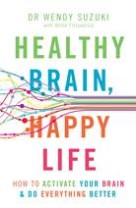Heads up! You can use your brain to make you happy and use your body to decrease your risk of dementia by 32 per cent. This is not New Age nonsense. It’s the word on the street from award-winning university professor and world-renowned neuroscientist Dr Wendy Suzuki.
I bookmarked so many bits of Suzuki’s new book Healthy Brain, Healthy Life it’s embarrassing. But I was genuinely fascinated by how she changed her life through regular exercise and through using simple cognitive workouts she calls Brain Hacks.
Here’s a nutshell of what Suzuki says her book offers.
‘I have tried to give you the tools that you need to start to improve your memory, attention, mood and overall zest for life with aerobic and intentional exercise that will serve to kick-start your brain plasticity.’
Tick.
The book also offers an easy-to-grasp understanding of neuroscience and a fly-on-the-wall look into Suzuki’s life and the research that helped her to revolutionise it.
Love affairs, the romantic gift of a cello, university lectures that incorporate exercise with vocalised affirmations (to test the real effects of these actions on neuroplasticity), pacy explanations of the most recent and rigorous brain-related research … all this and more results in a page-turner up there with Norman Doidge’s The Brain that Changes Itself. I lapped it up.
Suzuki attributes the book’s engrossing storytelling to her co-author Billie Fitzpatrick.
I was also inestimably pleased by the book’s neat structure and how it aided my comprehension. That each chapter contained Suzuki’s narrative (first), a pithy summary of her key points (second) and a bulleted list of Brain Hacks for readers to try (third) pleased me so much I briefly wondered if I’d been subjected to some subliminal neurological conjuring trick. (Yeah, my suspicious mind … )
I’m a gym junkie, so it was great to hear about the ways exercising can enhance the brain—including evidence that shows exercise increases brain cells and their connectivity, and boosts a neurotrophic factor called BDNF.
What we don’t know yet is the best way to exercise for brain health.
What we do know is:
- Aerobic exercise like running, walking and cycling is looking promising.
- Moderate-intensity exercise that makes you slightly out of breath is best.
- Exercising three times a week or more decreases your risk of dementia by 32 per cent.
- Chronic stress can negatively affect the brain but exercise can reduce the long-term effects of stress.
- Exercise activates the same reward pathways in the brain as drugs and might help to manage cravings.
Suzuki also says:
- Long-term meditation can increase the size of certain areas of the brain.
- If you want to boost your creativity or shift writer’s block you should take a walk.
- The idea that we use only 10 per cent of our brain is 100 per cent false.
The Brain Hacks Suzuki suggests take just four minutes each and there are a few I’d like to try soon. They include:
- Having a four-minute pillow fight with someone I love (who’s up for it?).
- Spending at least four minutes sitting and getting lost visually in a piece of artwork I’m not familiar with.
- Eating a meal in darkness and noting how the lack of visual information affects my sensation of the food.
Four minutes! Not so hard to reshape the brain and your life, then, if that’s all it takes? Four minutes and I’ll have the prefrontal cortex of a neuroscientist. Excellent.
Well, not quite.
As Suzuki’s narrative demonstrates, changing your brain and your life is a process. She also shows the process can work.
One change Suzuki makes is to start telling her (undemonstrative) parents she loves them—and asking them if they’d mind telling her they love her back.
You’ll learn more than this from her, of course—and this makes it a good book to read if your life or your brain is stuck in a rut.




Recent Comments